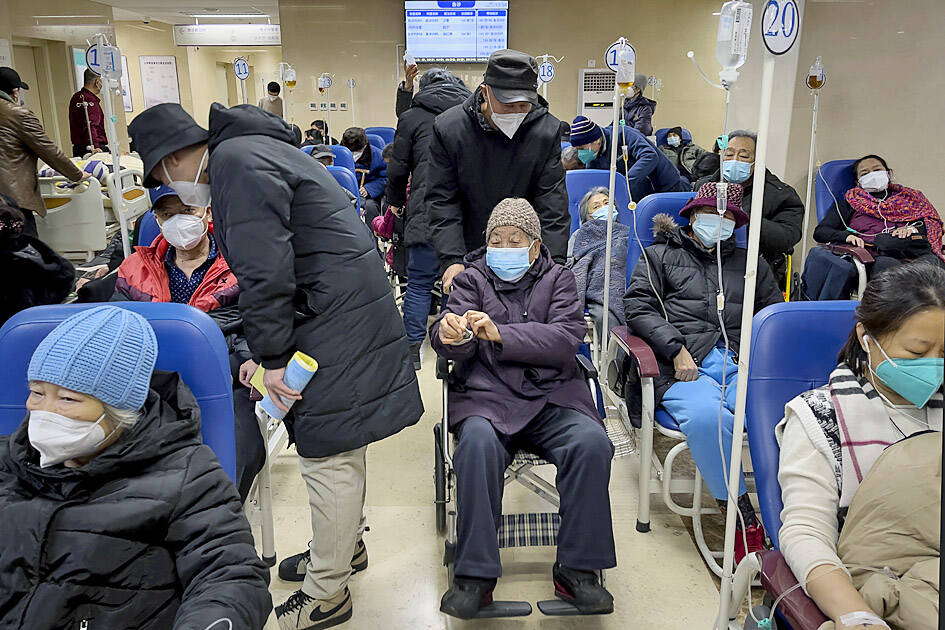Chinese state media played down the severity of a surge of COVID-19 infections ahead of an expected briefing yesterday by its scientists to the WHO, which is hoping for a “detailed discussion” on the evolution of the coronavirus.
China’s abrupt U-turn on COVID-19 controls on Dec. 7, as well as the accuracy of its case and mortality data, have come under increasing scrutiny at home and abroad.
The Chinese Ministry of Foreign Affairs labeled travel entry curbs imposed by some nations as “simply unreasonable,” saying they “lacked scientific basis.”

Photo: AP
“We are willing to improve communication with the world, but ... we are firmly opposed to attempts to manipulate the epidemic prevention and control measures for political purposes, and will take corresponding measures in different situations according to the principle of reciprocity,” ministry spokeswoman Mao Ning (毛寧) told reporters in Beijing.
As the virus spreads unchecked, funeral parlors have reported a spike in demand for their services and international health experts predict at least 1 million deaths in China this year.
China yesterday reported three new COVID-19 deaths, taking its official death toll since the pandemic began to 5,253.
The People’s Daily yesterday cited Chinese experts as saying the illness caused by the virus was relatively mild for most people.
“Severe and critical illnesses account for 3 percent to 4 percent of infected patients currently admitted to designated hospitals in Beijing,” Beijing Chaoyang Hospital vice president Tong Zhaohui (童朝暉) told the newspaper.
West China Tianfu Hospital of Sichuan University president Kang Yan (康焰) said that in the past three weeks, 46 patients had been admitted to intensive care units, or about 1 percent of symptomatic infections.
The emergencies area at Zhongshan Hospital in Shanghai was packed with patients yesterday, a witness said.
Some were in beds in the corridor receiving intravenous therapy, while dozens were lining up around them, waiting to see a doctor.
The WHO has urged Chinese health officials to regularly share specific and real-time information on the outbreak. It has invited Chinese scientists to present detailed data on viral sequencing at a technical advisory group meeting. It has also asked China to share data on hospitalizations, deaths and vaccinations.
Ahead of the meeting scheduled for yesterday afternoon in Geneva, Switzerland, a WHO spokesperson said that a “detailed discussion” was expected about circulating variants in China, and globally, with Chinese scientists expected to make a presentation, but some experts doubted that China would be very forthright.
“I don’t think China will be very sincere in disclosing information,” said Alfred Wu (吳木鑾), associate professor at the Lee Kuan Yew School of Public Policy at National University of Singapore. “They would rather just keep it to themselves or they would say nothing happened, nothing is new. My own sense is that we could assume that there is nothing new ... but the problem is China’s transparency issue is always there.”

Tropical Storm Gaemi strengthened into a typhoon at 2pm yesterday, and could make landfall in Yilan County tomorrow, the Central Weather Administration (CWA) said yesterday. The agency was scheduled to issue a sea warning at 11:30pm yesterday, and could issue a land warning later today. Gaemi was moving north-northwest at 4kph, carrying maximum sustained winds near its center of up to 118.8kph and gusts of 154.8kph. The circumference is forecast to reach eastern Taiwan tomorrow morning, with the center making landfall in Yilan County later that night before departing from the north coast, CWA weather forecaster Kuan Shin-ping (官欣平) said yesterday. Uncertainty remains and

SEA WARNING LIKELY: The storm, named Gaemi, could become a moderate typhoon on Wednesday or Thursday, with the Taipei City Government preparing for flooding A tropical depression east of the Philippines developed into a tropical storm named Gaemi at 2pm yesterday, and was moving toward eastern Taiwan, the Central Weather Administration (CWA) said. Gaemi could begin to affect Taiwan proper on Tuesday, lasting until Friday, and could develop into a moderate typhoon on Wednesday or Thursday, it said. A sea warning for Gaemi could be issued as early as Tuesday morning, it added. Gaemi, the third tropical storm in the Pacific Ocean this typhoon season, is projected to begin moving northwest today, and be closest to Taiwan on Wednesday or Thursday, the agency said. Today, there would likely

DISRUPTIONS: The high-speed rail is to operate as normal, while several airlines either canceled flights or announced early departures or late arrivals Schools and offices in 15 cities and counties are to be closed today due to Typhoon Gaemi, local governments announced last night. The 15 are: Taipei, New Taipei City, Taoyuan, Tainan, Keelung, Hsinchu and Kaohsiung, as well as Yilan, Hualien, Hsinchu, Miaoli, Chiayi, Pingtung, Penghu and Lienchiang counties. People should brace for torrential rainfall brought by the storm, with its center forecast to make landfall on the east coast between tonight and tomorrow morning, the Central Weather Administration (CWA) said. The agency issued a sea warning for the typhoon at 11:30pm on Monday, followed by a land warning at 11:30am yesterday. As of

CASUALTY: A 70-year-old woman was killed by a falling tree in Kaohsiung as the premier warned all government agencies to remain on high alert for the next 24 hours Schools and offices nationwide are to be closed for a second day today as Typhoon Gaemi crosses over the nation, bringing torrential rain and whipping winds. Gaemi was forecast to make landfall late last night. From Tuesday night, its outer band brought substantial rainfall and strong winds to the nation. As of 6:15pm last night, the typhoon’s center was 20km southeast of Hualien County, Central Weather Administration (CWA) data showed. It was moving at 19kph and had a radius of 250km. As of 3pm yesterday, one woman had died, while 58 people were injured, the Central Emergency Operation Center said. The 70-year-old